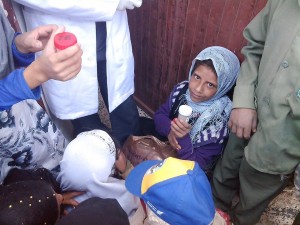Compassion Matters: Toward Eliminating NTDs in Yemen
A Conversation with Dhekra Annuzaili
Program Manager, Schistosomiasis Control Initiative for Yemen and Sudan
David: Thank you for speaking with me, Dhekra. I first learned about your work in March 2017, when we both attended the neglected tropical diseases (NTD) Summit meeting in Geneva. You received the Exceptional Service Award for your contributions to NTD control and elimination, and you spoke briefly about some of the obstacles that you’ve overcome.
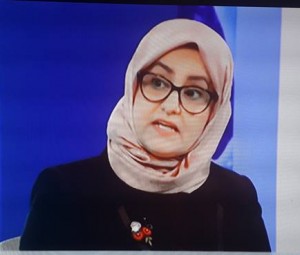 Dhekra: Thank you so much, David. Actually, overcoming obstacles is a continuous process. Sometimes I joke with my friends and say that if there aren’t any more challenges I will quit! I need to be challenged to be productive and efficient. If my life is too easy, I don’t think I will accomplish much.
Dhekra: Thank you so much, David. Actually, overcoming obstacles is a continuous process. Sometimes I joke with my friends and say that if there aren’t any more challenges I will quit! I need to be challenged to be productive and efficient. If my life is too easy, I don’t think I will accomplish much.
David: You’ve spent much of your career as a physician working on control and elimination of NTDs, especially schistosomiasis. What drew you to this field and what led you to the work that you are doing now?
Dhekra: After my medical training and specialization as a pediatrician and a neonatologist at Hammersmith Hospital in London, I returned to Yemen to become the head of the department of neonatology in a large, well-regarded public hospital. I was the youngest among fifteen doctors from different parts of Yemen.
I was filled with enthusiasm to improve child health and reduce the high rates of neonatal deaths in Yemen. I did my best. I insisted on very simple measures, such as handwashing before handling the premature babies to reduce the risk of infection. I made other innovations, such as opening a breastfeeding room to encourage breastfeeding, and allowing visits of mothers and fathers to be with their children in the neonatal unit. These changes were met with a lot of resistance, and after a period of prayer and discernment I decided to resign from my position at the hospital.
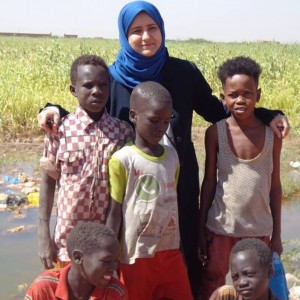 I took my passion for child health and survival to the community level. I, along with a few fellow medical doctors, trained paramedics in very rural areas, where there were no hospitals or laboratories. I taught them how to manage basic health problems, such as pneumonia, malaria, fever, and intestinal worms. This led to a position with UNICEF as a nutrition officer, where I learned about the nutritional impact of soil-transmitted helminths (intestinal worms). After 6 years with UNICEF I was hired by the World Bank to work on a variety of health projects. One of them was schistosomiasis control, and that led in 2012 to my current position with the Schistosomiasis Control Initiative (SCI).
I took my passion for child health and survival to the community level. I, along with a few fellow medical doctors, trained paramedics in very rural areas, where there were no hospitals or laboratories. I taught them how to manage basic health problems, such as pneumonia, malaria, fever, and intestinal worms. This led to a position with UNICEF as a nutrition officer, where I learned about the nutritional impact of soil-transmitted helminths (intestinal worms). After 6 years with UNICEF I was hired by the World Bank to work on a variety of health projects. One of them was schistosomiasis control, and that led in 2012 to my current position with the Schistosomiasis Control Initiative (SCI).
David: What a great story. You kept opening the doors that appeared in front of you. I sense that you have a real passion to be a healer and to take care of the people under your charge, whether as a physician or as a public health doctor. In all of this, what has been the most rewarding aspect of your work?
Dhekra: Whether at the individual or community level, what matters the most for me is seeing poor people in remote areas getting the medicine they need. Seeing children swallow the medicine for the NTDs that affect them, and seeing them eager to receive it. They may not even be aware of the fact that the medicine for schistosomiasis will protect their health in the long term. Yemeni children have one of the highest rates of malnutrition in the world. Being involved in NTD control has given me a golden chance to fight one of the main causes of malnutrition among children.
The challenge of controlling neglected tropical diseases motivates me. Yemen as a country has been neglected, and within Yemen, as with many countries, health is neglected. And among health priorities, NTDs are neglected.
David: So it’s a paradox, isn’t it? You received an international award recognizing you for your work with the neglected-neglected-neglected. What has been the most challenging aspect of your work?
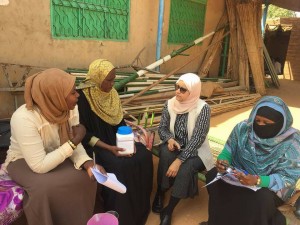 Dhekra: Since I started working as a medical doctor, there have always been some people who have tried to put me down based on what they believe a woman’s role should be. I live in a male-dominated society and it’s difficult for communities – including other women – to accept the idea that women can, or even want to, excel at work, unless it’s housework. For example, when I was working the night shift on the pediatric ward of the hospital, some people – especially from rural areas – would make me feel uncomfortable about not being at home instead. I have done so much in my career, and my value isn’t determined by other people’s thoughts and opinions. However, it’s true that I had to struggle. I had to put in more effort that any of the men around me, and I had to sacrifice a lot of things in life, just in order to be heard and to work toward my goals. I am not one to give up, especially when I know that I’m doing the right thing, but sometimes intense difficulties were a daily reality for me.
Dhekra: Since I started working as a medical doctor, there have always been some people who have tried to put me down based on what they believe a woman’s role should be. I live in a male-dominated society and it’s difficult for communities – including other women – to accept the idea that women can, or even want to, excel at work, unless it’s housework. For example, when I was working the night shift on the pediatric ward of the hospital, some people – especially from rural areas – would make me feel uncomfortable about not being at home instead. I have done so much in my career, and my value isn’t determined by other people’s thoughts and opinions. However, it’s true that I had to struggle. I had to put in more effort that any of the men around me, and I had to sacrifice a lot of things in life, just in order to be heard and to work toward my goals. I am not one to give up, especially when I know that I’m doing the right thing, but sometimes intense difficulties were a daily reality for me.
A second challenge in my work is a lack of awareness in the community that NTDs are a major threat to their health.
David: In the face of these and other challenges, what is it that sustains you and keeps you going? What inner resources do you draw on?
Dhekra: To be honest, I was raised to be like this! My parents had only three daughters. In a society like Yemen, a man’s biggest pride is his son, since the son carries on his father’s name. Everyone inside and outside the family was constantly encouraging my father to marry another woman so that he could have a son. They thought that daughters could not make my father proud, since we would just marry and belong to another man. But my father stood up to everyone and let them know that each of his three daughters is worth 30 men! The way my mother and father responded set a great example for me to believe in myself and my abilities. I also think that I inherited my father’s ability to continue moving forward with external confidence, even when shaken internally.
Second is the faith that my mother raised us with. So it’s my parents, and my religion. My religious faith supports my spirit and enriches my heart with the resources I need to overcome obstacles.
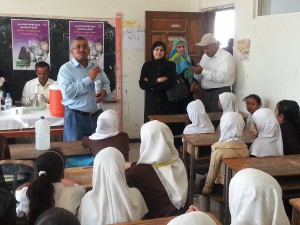 David: Your life seems deeply grounded in the value of compassion. Your compassion for individual neonates led you to implement changes to improve their health. Now you are providing medicines to treat whole populations and prevent the scourge of schistosomiasis or bilharzia. Would you reflect on the role of compassion in your life and how it’s influenced your work?
David: Your life seems deeply grounded in the value of compassion. Your compassion for individual neonates led you to implement changes to improve their health. Now you are providing medicines to treat whole populations and prevent the scourge of schistosomiasis or bilharzia. Would you reflect on the role of compassion in your life and how it’s influenced your work?
Dhekra: This is the most difficult question, to be honest, and to speak of it requires philosophical language (…silence…)
David: Silence can be an appropriate response to this question…
Dhekra: If I understand correctly, whether in global health or health care in general, compassion is the human interaction between a responsible, honest and sincere person and someone who is in need. This is the most important element of compassion in my opinion.
David: Yes. As I understand it, compassion has three components. First, you have to be aware of suffering, and as a physician you’re very aware of it. Second, you have to be moved emotionally, you have to have an emotional resonance, or empathy, with the person who’s suffering. As you’ve said, the third thing about compassion is work – the action to alleviate the suffering that you see. It seems to me that your whole professional life has been dedicated to relieving suffering, so personally I see you embodying compassion through who you are.
Dhekra: Thank you. I didn’t fully realize this before, but it was the suffering of the patients I was dealing with (whether newborn babies or malnourished children under five years old, or tiny, pale, stunted school students) that pushed me to continue. It’s their suffering that pushed me to do all I could to prevent their pain.
David: I’m curious about how we often talk about the values of justice and equity, which are very, very important, but we don’t talk much about compassion.
Dhekra: Yes, very important. Thank you for raising this. We are always talking about equity and gender balance and such things, but what about compassion? If we can be more compassionate to others, our work will go more smoothly and sincerely. We are passing through many difficulties now as humans, and I see this in people’s eyes, children’s eyes, mothers’ eyes, whenever I go. Responding to suffering with compassion will make our work more sincere and more fruitful.
David: Dhekra, if a young person comes to you and says, I want your job someday, or I want to work in global health, what advice would you have for them?
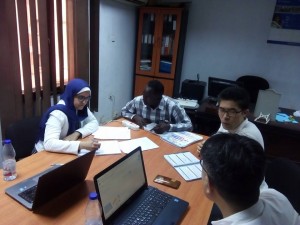 Dhekra: Well young people nowadays want to achieve everything right away, and they want to reach their goals very quickly without investing in the process. In my opinion, one of the reasons for this is that technology is changing the way we think, feel, and interact. I think it’s important for young people to be passionate about their work, their goals, to focus on one goal at the beginning, and then, if they want, to expand their horizons later. I would also encourage them to adapt to different environments, and not allow their surroundings to distract them from whatever it is that they would like to accomplish. Young people today are more advantaged than we were. They have more tools to interact locally, internationally, globally, whatever. They can express themselves very well. I would advise them to be humble, simple, clear and to-the-point, and to focus on their goal, that’s it.
Dhekra: Well young people nowadays want to achieve everything right away, and they want to reach their goals very quickly without investing in the process. In my opinion, one of the reasons for this is that technology is changing the way we think, feel, and interact. I think it’s important for young people to be passionate about their work, their goals, to focus on one goal at the beginning, and then, if they want, to expand their horizons later. I would also encourage them to adapt to different environments, and not allow their surroundings to distract them from whatever it is that they would like to accomplish. Young people today are more advantaged than we were. They have more tools to interact locally, internationally, globally, whatever. They can express themselves very well. I would advise them to be humble, simple, clear and to-the-point, and to focus on their goal, that’s it.
David: I can’t end our time together without acknowledging the human tragedy that continues to unfold in your home country, Yemen. While you are working now in Sudan and elsewhere, your homeland is being torn apart. I want to acknowledge how difficult this must be and how seemingly helpless the world has behaved in addressing it.
Dhekra: It is very difficult. When you have an uncertain future, an uncertain land, an uncertain home, and you are being manipulated by people not only within your country but also by others externally, this leads to a lot of insecurity and instability for the whole population. People like me and others who fled the country are living relatively better than those who stayed. They are now surrounded or blocked from even receiving medical supplies, blocked from having safe shelter. They are living in shelters in the desert, in the street, and they don’t know when the next airstrike will come.
David: It is difficult to be aware of so much suffering and to be helpless, unable to do much to relieve it. And yet, I also think it’s important, as you said, to recognize what you can do and what you are already doing. It’s vital to extend that goodwill not only to people that you see yourself serving professionally, but also to colleagues and friends. In relationship to the magnitude of need, our efforts seem so small, but even in little ways, we can have an impact that we may never know about.
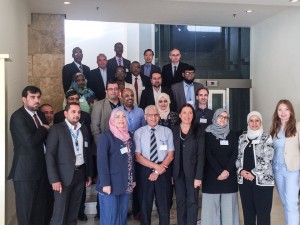 Dhekra: Yes, I had the opportunity yesterday to meet with Yemen’s ambassador to the United States. It was a chance to brief him on NTDs, even though his priority now is security and safety. It was a very positive meeting and we shared this common desire to help the people of Yemen. We heard each other. In the midst of tragedy and war, people can still come together.
Dhekra: Yes, I had the opportunity yesterday to meet with Yemen’s ambassador to the United States. It was a chance to brief him on NTDs, even though his priority now is security and safety. It was a very positive meeting and we shared this common desire to help the people of Yemen. We heard each other. In the midst of tragedy and war, people can still come together.
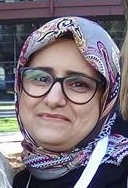 Dr Dhekra Annuzaili, MD, MPH, is an expert in Schistosomiasis, Soil Transmitted Helminths, Onchocerciasis, and school health and nutrition. Since early 2003, Dhekra has worked as a program manager with local and international development agencies including UNICEF and the World Bank. She received an international leadership award from the Flour Fortification Initiative/USA in 2007 for her successful efforts in advocating for fortifying wheat flour with iron and folic acid in Yemen. In 2009, Dhekra moved to the field of NTDs to specialize in Schistosomiasis control for Yemen and Sudan, also known as snail fever. In 2017, she was awarded the Exceptional Service Award by Uniting to Combat NTDs Coalition.
Dr Dhekra Annuzaili, MD, MPH, is an expert in Schistosomiasis, Soil Transmitted Helminths, Onchocerciasis, and school health and nutrition. Since early 2003, Dhekra has worked as a program manager with local and international development agencies including UNICEF and the World Bank. She received an international leadership award from the Flour Fortification Initiative/USA in 2007 for her successful efforts in advocating for fortifying wheat flour with iron and folic acid in Yemen. In 2009, Dhekra moved to the field of NTDs to specialize in Schistosomiasis control for Yemen and Sudan, also known as snail fever. In 2017, she was awarded the Exceptional Service Award by Uniting to Combat NTDs Coalition.

